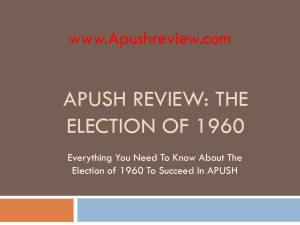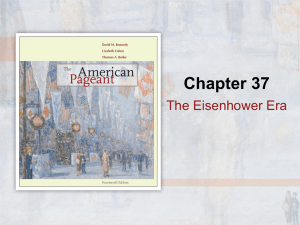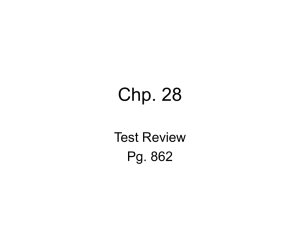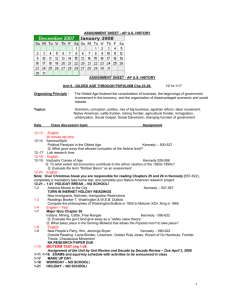Chapter 37 & 38 Study Gu
advertisement
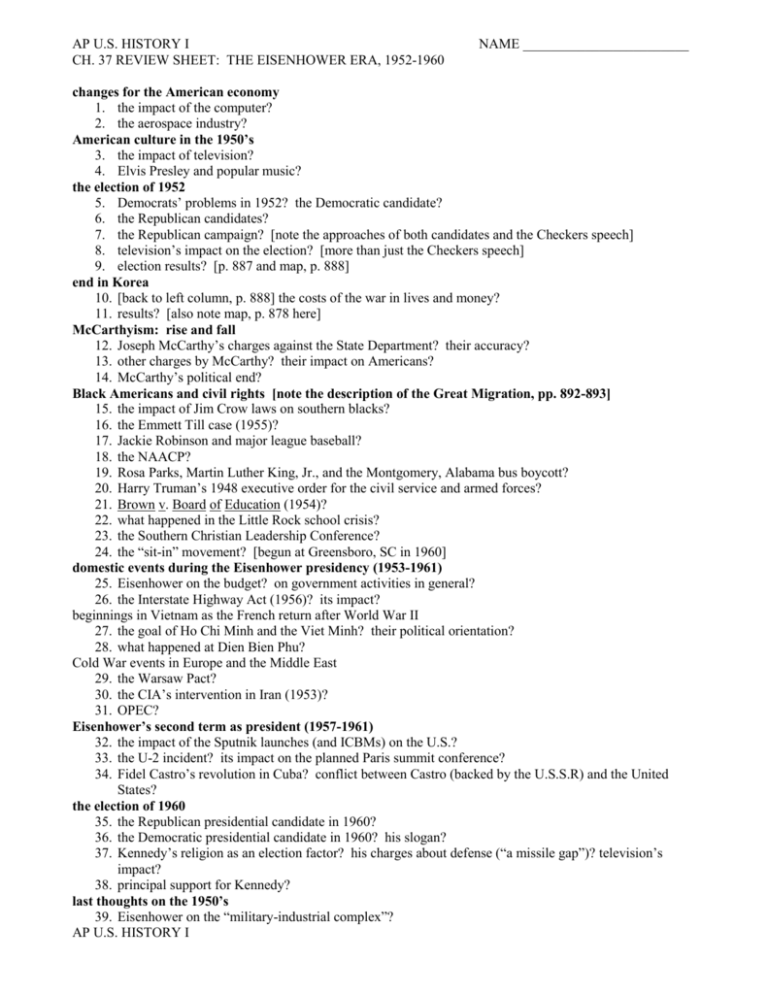
AP U.S. HISTORY I CH. 37 REVIEW SHEET: THE EISENHOWER ERA, 1952-1960 NAME ________________________ changes for the American economy 1. the impact of the computer? 2. the aerospace industry? American culture in the 1950’s 3. the impact of television? 4. Elvis Presley and popular music? the election of 1952 5. Democrats’ problems in 1952? the Democratic candidate? 6. the Republican candidates? 7. the Republican campaign? [note the approaches of both candidates and the Checkers speech] 8. television’s impact on the election? [more than just the Checkers speech] 9. election results? [p. 887 and map, p. 888] end in Korea 10. [back to left column, p. 888] the costs of the war in lives and money? 11. results? [also note map, p. 878 here] McCarthyism: rise and fall 12. Joseph McCarthy’s charges against the State Department? their accuracy? 13. other charges by McCarthy? their impact on Americans? 14. McCarthy’s political end? Black Americans and civil rights [note the description of the Great Migration, pp. 892-893] 15. the impact of Jim Crow laws on southern blacks? 16. the Emmett Till case (1955)? 17. Jackie Robinson and major league baseball? 18. the NAACP? 19. Rosa Parks, Martin Luther King, Jr., and the Montgomery, Alabama bus boycott? 20. Harry Truman’s 1948 executive order for the civil service and armed forces? 21. Brown v. Board of Education (1954)? 22. what happened in the Little Rock school crisis? 23. the Southern Christian Leadership Conference? 24. the “sit-in” movement? [begun at Greensboro, SC in 1960] domestic events during the Eisenhower presidency (1953-1961) 25. Eisenhower on the budget? on government activities in general? 26. the Interstate Highway Act (1956)? its impact? beginnings in Vietnam as the French return after World War II 27. the goal of Ho Chi Minh and the Viet Minh? their political orientation? 28. what happened at Dien Bien Phu? Cold War events in Europe and the Middle East 29. the Warsaw Pact? 30. the CIA’s intervention in Iran (1953)? 31. OPEC? Eisenhower’s second term as president (1957-1961) 32. the impact of the Sputnik launches (and ICBMs) on the U.S.? 33. the U-2 incident? its impact on the planned Paris summit conference? 34. Fidel Castro’s revolution in Cuba? conflict between Castro (backed by the U.S.S.R) and the United States? the election of 1960 35. the Republican presidential candidate in 1960? 36. the Democratic presidential candidate in 1960? his slogan? 37. Kennedy’s religion as an election factor? his charges about defense (“a missile gap”)? television’s impact? 38. principal support for Kennedy? last thoughts on the 1950’s 39. Eisenhower on the “military-industrial complex”? AP U.S. HISTORY I CH. 38 REVIEW SHEET: THE STORMY SIXTIES, 1960-1968 John Kennedy becomes president (1961) 1. “the best and the brightest”? 2. Kennedy’s goal in space? foreign policy in the Kennedy years 3. the Berlin Wall? [note map, p. 867] 4. Kennedy’s objections to the policy of “massive retaliation”? 5. flexible response as a policy? 6. potential problems with flexible response? 7. problems in Vietnam? 8. Kennedy’s response? [note both the anti-Diem coup and use of American troops] 9. the intent of the Bay of Pigs invasion? its outcome? 10. the impact of the Cuban missile crisis on the arms race? civil rights in the Kennedy years 11. the actions of the Freedom Riders? 12. the Kennedy relationship with Martin Luther King? 13. Kennedy’s speech in June, 1963? King’s speech in August, 1963? [note newspaper accounts, p. 919] Kennedy’s death: November 22, 1963 14. two murders in Dallas? 15. the Warren Commission? Lyndon Johnson becomes president 16. the Civil Rights Bill of 1964? 17. the War on Poverty? [note the emphasis on Appalachia] 18. the Great Society? 19. our text’s assessment of events in the Gulf of Tonkin? the Congressional Gulf of Tonkin Resolution? 20. the results of the election of 1964? [note map on p. 922] domestic events in the Great Society era 21. Medicare? 22. Medicaid? 23. the Twenty-fourth Amendment? 24. the Voting Rights Act of 1965? 25. the Watts Riots? 26. Malcolm X’s ideas? [note comments from King and Malcolm X, p. 925] 27. the death of Dr. King? escalation in Vietnam--and at home 28. Johnson’s goal in escalating the war? 29. the credibility gap? 30. the Tet Offensive [January, 1968]? the election of 1968 31. [Democrat and dove] Eugene McCarthy’s entry into the campaign? 32. [Democrat] Robert Kennedy on the war? 33. Johnson’s two announcements in March, 1968? 34. Robert Kennedy’s death? 35. events in Chicago outside the Democratic convention? 36. election results? [note map. p. 932] cultural conflict in the 1960’s 37. the Berkeley Free Speech movement? 38. SDS and the Weathermen?

